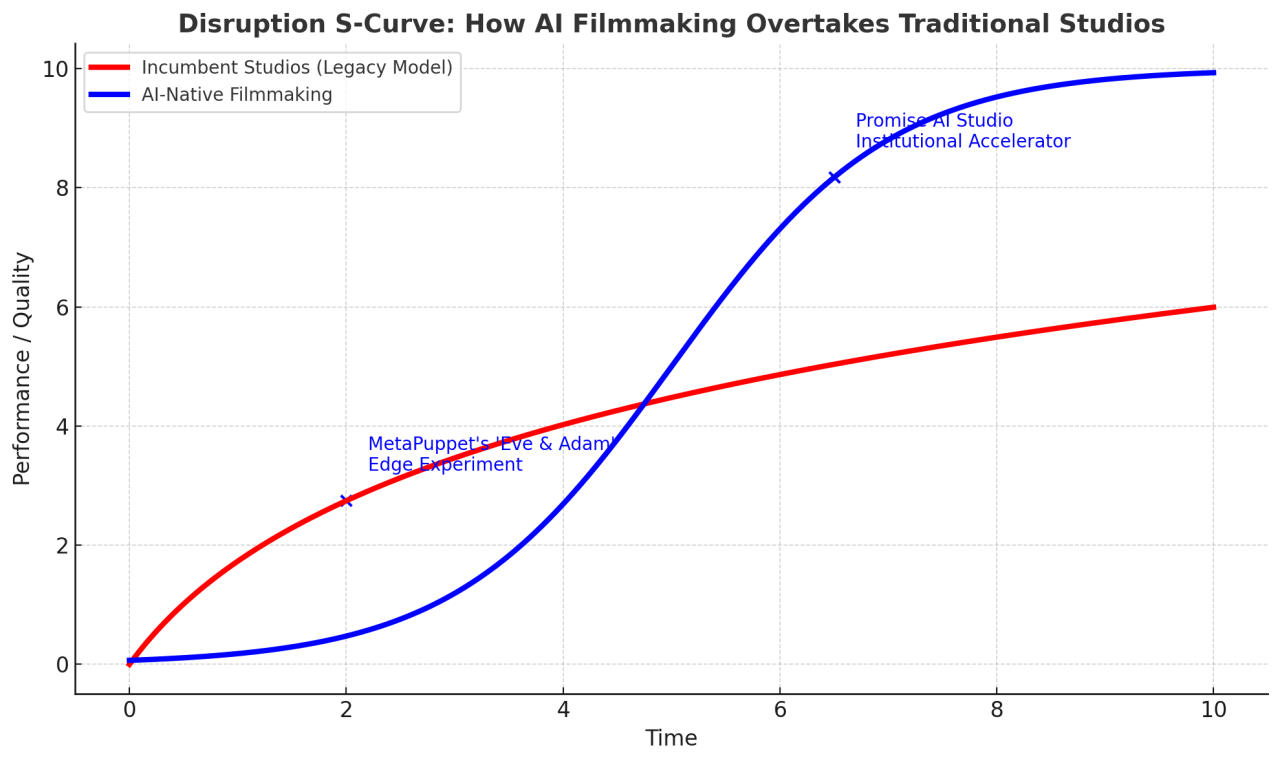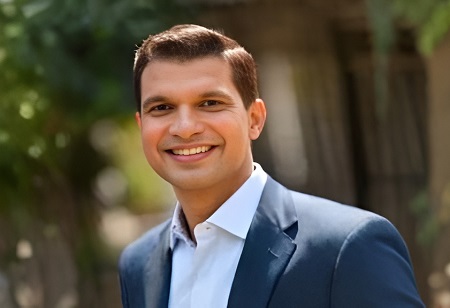The AI Disruption of Filmmaking - and the New Models It Will Spawn
In an exclusive conversation with Media Infotainment, Sameer Sankhe—strategist, product builder, and author of Make Them Love It!—explores how AI is disrupting filmmaking and reshaping storytelling. Drawing on MetaPuppet’s AI-assisted film Eve & Adam and the rise of AI-native studios like Promise Advanced Imagination, he explains how generative AI enables “edit-before-you-make” workflows, lowers barriers for creators, and spawns new formats. Sankhe emphasizes that while AI accelerates scale and imagination, only strong storytelling ensures films remain bold, meaningful, and unforgettable.
A Story from the Frontier
A few weeks ago, Emmy Award–winning editor and screenwriter MetaPuppet unveiled ‘Eve & Adam’, an AI-assisted short film. It wasn’t a conventional production. No crew trucks, no set builds, no 4 a.m. call sheets. Instead, MetaPuppet used generative AI to adapt the themes of digital transformation into a cinematic drama about ambition, reinvention, and the collision of human instinct with machine intelligence.
He directed each shot using JSON prompts — field-by-field instructions telling the AI camera exactly where to move, how to light, and what kind of film stock to emulate. In one pivotal sequence, he captured the essence of reinvention: a corporate headquarters stuck in the past — flickering fluorescent lights, disengaged employees, and stacks of paper — gradually morphing into a futuristic innovation hub alive with AI-driven collaboration, immersive customer pods, and cross-functional 'cells' buzzing with energy.
It was almost a cinematic expression of the principles I outline in my book ‘Make Them Love It! – An AI-Driven Digital Transformation Guide’: that organizations must shed legacy inertia and reimagine themselves for a new era. The result wasn’t a gimmick. It was a cinematic teaser compelling enough to pitch as a streaming concept — created without a single physical shoot day. And it underscored something deeper: this wasn’t just a film experiment. It was a working prototype of how filmmaking itself might get disrupted.
“In a few years, a multi-billion dollar Avenger-like movie can be made by just 10 people”
What the Disruption Will Look Like
Clayton Christensen’s Disruption Theory explains that technologies don’t topple industries by attacking the core first. They start at the edges — serving customers incumbents ignore — and at first, their output isn’t 'good enough.' That’s exactly where AI filmmaking sits today: - Low-End Disruption: Indie creators, YouTubers, small agencies, and regional storytellers priced out of traditional production can now achieve cinematic output. - New-Market Disruption: Entirely new creators — novelists, entrepreneurs, game designers, educators — can now direct visually without years of training.
Studios will dismiss this as 'not real filmmaking.' Kodak dismissed digital cameras. BlackBerry scoffed at the iPhone. But quality climbs quickly: characters hold continuity, AI-assisted editing tightens story flow, and runtime constraints vanish. And when AI-native productions become 'good enough' for mid-budget streaming, the economics flip.
Also Read: AI's Role in Generating Compelling and Consistent Content
Why This Matters — Steve Jobs’ Lesson
Steve Jobs once explained why filmmaking is so unforgiving: directors shoot ten to a hundred times more footage than what ends up on screen, but they onlydiscover what works in the editing room — when the actors are gone, the sets struck, and the money spent. Walt Disney solved this for animation by 'editing before making' — storyboards, scratch voices, scratch music, and reels iterated thousands of times.
At Pixar, John Lasseter instilled the culture of 'story, story, story.' It isn’t just an alternative form of film — it’s a disruption of the entire process of filmmaking itself. His workflow collapses the old 'we only discover too late in the edit' trap into something like Disney’s story reels, except now it’s done at cinematic fidelity and by a single creator. That’s one more way AI filmmaking will be disruptive: it won’t only make alternate films, it will also alter the way the whole filmmaking process works — even in traditional productions.
“AI won’t only make alternate films — it will alter the way the whole filmmaking process works, even in traditional productions.”
Promise Advanced Imagination — From Edge to Institution
This is also why MetaPuppet’s role at Promise Advanced Imagination, Inc. matters so much. Promise isn’t just another studio. It’s the first AI-native entertainment company, backed by The North Road Company, Andreessen Horowitz, and Google’s AI Futures Fund. Their thesis is bold: build the 'next Pixar' — not through traditional animation, but through AI-native storytelling formats that merge the emotional resonance of film with the interactivity of games.
Their proprietary MUSE platform integrates Gemini, Veo, and other frontier AI models into a unified production pipeline — solving the industry’s central problem: fragmented tools with no end-to-end workflow. And here’s the critical point: Promise isn’t betting only on making alternate AI-native films.
It’s also betting on transforming the entire filmmaking process — even for traditional blockbusters. Just as ‘Eve & Adam’ demonstrated, AI allows you to 'edit before you make,' collapsing months of risk into days of iteration. That’s one more way AI filmmaking will be disruptive: it won’t only create new kinds of films, it will also alter how all films get made.
“AI won’t just make new kinds of films. It will change how every film, big or small, gets made.”
Also Read: Leveraging Generative AI for Scalable B2B Content Marketing
Five Emerging Models of AI Filmmaking
1. Continuous Story Worlds – Editable films and series that evolve over time. 2. Hyper-Local Originals – Core story adapted into multiple cultural versions. 3. Interactive & Branching Films – AI-driven narratives merging games and cinema. 4. Micro-Budget Premium – High-quality, festival-ready films for under Rs. 10 lacs. 5. Instant IP Expansion – Multi-format content (games, VR, comics) from day one.
Final Frame
The work of AI-based filmmaking demonstrates what Steve Jobs and Walt Disney intuited decades ago: build the movie before you make it. Promise’s funding and positioning show how that disruption scales into an institutional one. Christensen’s theory predicts the rest: incumbents will scoff, the edge will improve, and the centre of gravity will shift.
This is the same truth I emphasise in *Make Them Love It! – An AI-Driven Digital Transformation Guide*: transformation isn’t about the technology itself, but how you use it to create a product that customers will love. AI won’t save bad stories. But in the hands of disruptors like MetaPuppet and Promise, good stories can be told bolder, faster, and unforgettable.
“No amount of technology can save a bad story. But with AI, good stories can be told bolder, faster, and more unforgettable than ever before.”
🍪 Do you like Cookies?
We use cookies to ensure you get the best experience on our website. Read more...






